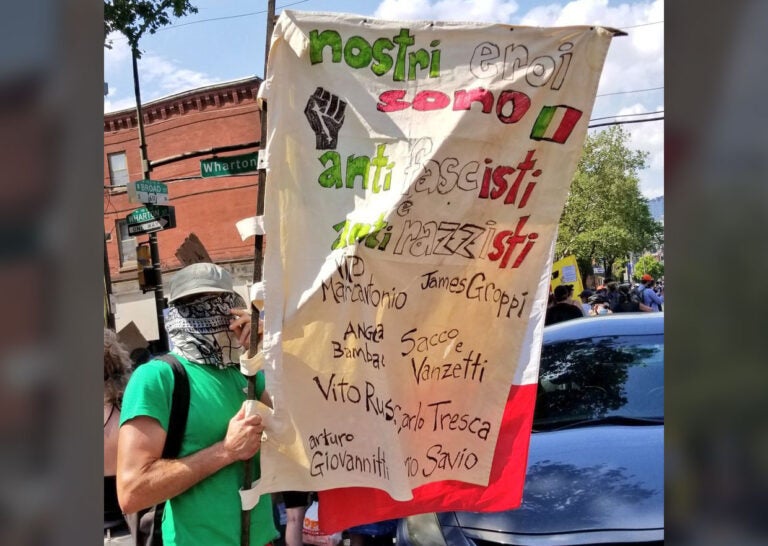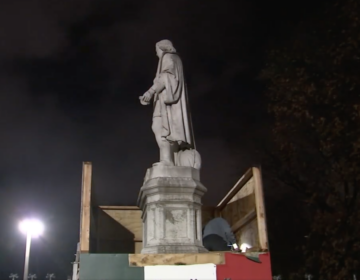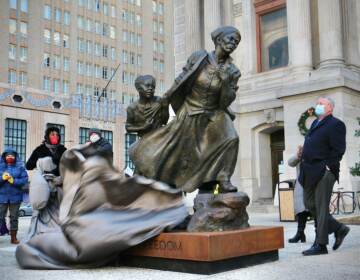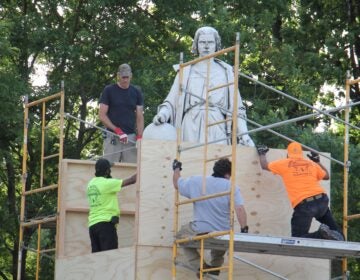Contro Colombo: It’s time to honor our Italian ancestors by removing racist monuments
Not all Italian Americans want statues of Christopher Columbus to represent their familial history.

A protester carries a sign in Italian that reads "Our heroes are anti-fascists and anti-racists." (Photo courtesty of Jeffrey Bussmann)
For too long, mainstream Italian American organizations and figureheads have claimed to speak for our community — framing critiques of figures like Christopher Columbus — as attacks on all Italian Americans. But they don’t speak for all of us.
These organizations ignore those who work in solidarity with Black and Indigenous movements and erase the racial and ideological diversity of people within the Italian diaspora. Many descendants of Italian immigrants in Philadelphia support the removal of all public monuments devoted to symbols of white supremacy and violence, including that of Christopher Columbus and Frank Rizzo.
We encourage everyone to read all the demands of the Black Philly Radical Collective, and support their demands to remove all monuments related to state violence against Black, Indigenous and brown Philadelphians. Because of our community’s part in the installation and preservation of some of the worst of these monuments, we think it’s important to state that we unequivocally support the work of Black activists, such as Philly R.E.A.L. Justice and Black Lives Matter Philadelphia to remove monuments to Rizzo. Likewise, we support the work of groups like Indigenous 215 who have advocated for monuments to Christopher Columbus to be removed.
We are disturbed by our extended famiglia’s response to the protests and the potential removal of racist monuments, though we are not surprised. The violent mob that gathered at Marconi Plaza in South Philadelphia to “protect” a Columbus statue — based on a false Facebook rumor — as well as last month’s public hearings on the statue, made it clear that there is a stubborn commitment among many Italian Americans in Philadelphia to mythologize figures known for their brutality and bigotry. Many speakers repeated the racist historical revisionist project by city employee Robert Petrone, which have become a set of talking points. This is an attempt to whitewash and rewrite the well-established historical record on Columbus, whose acts of genocidal brutality against Indigenous people were considered appalling by even his contemporaries.
Many who testified at the virtual public hearing over the proposal to remove the statue, view the creation of Columbus Day as a way to honor our community during a period of anti-Italian discrimination in the U.S. In reality, honoring Columbus does not represent a desire to confront xenophobic bigotry, but rather to position Italian Americans on the “winning” side of it. Let us not forget that in the 1920’s and 30’s, the Fascist Party in Italy courted Italian immigrant communities abroad, which they considered “colonies” of the Italian state. The Fascists and their sympathizers in the U.S., including media magnate Generoso Pope and The Order of the Sons of Italy, who helped organize the first U.S. Fascist convention in Philadelphia, as well as the Catholic Knights of Columbus, lobbied to make Columbus Day a national holiday.
Similarly, while many white Philadelphians choose to remember Rizzo’s reign as a period where people felt “safe” in our city, Rizzo is known to many as one of the architects of racist policing in Philadelphia. As Police Commissioner from 1967 to 1970 and Philadelphia Mayor from 1971 to 1980, his legacy is one of terror for Black, brown and LGBTQ Philadelphians. This culture can still be seen today, most recently in the protests where police beat protestors over the head with batons, pulled down masks to spray mace in faces and tear gassed protestors on I-676 and an entire neighborhood on 52nd street in West Philadelphia. There are also decades of similar acts, unfilmed and unseen, of intimidation, surveillance, policing and incarceration committed against Black Philadelphians.
White Italian Americans have historically been some of the loudest cheerleaders for this brand of racist policing against our Black, brown, Indigenous and non-white immigrant neighbors. We have eagerly aligned ourselves with symbols and institutions of white supremacist culture in order to access the security and rewards of whiteness in America, while at the same time, using our brief experience of discrimination as a cudgel against people who are currently victims of racist oppression and xenophobia and those who were historically much more oppressed.
This is a betrayal of our own histories and the potential they hold to foster empathy and solidarity.
Many of our ancestors brought radical traditions of struggle with them to America, and recognizing the inhumanity of racist capitalism enthusiastically fought to create a more equitable world. Their memory is far more worthy of our respect than that of Columbus or Rizzo. Following in their footsteps would mean mobilizing to join contemporary struggles for justice, as many of us have chosen to do.
It is not lost on us that among the people claiming to speak for “the community” were many people with a track record of doing harm to others from positions of power. In addition to those who congregated in an angry drunken mob threatening and assaulting people and making a park unsafe for over a week with the protection of local police, the pro-Columbus speakers list included: a federally indicted, notoriously corrupt former state rep who took the opportunity to make racist threats; a disgraced former judge; and the founder of a museum in New York who was sued for harassment, removed from his post in an Italian American cultural organization, and notoriously evicted an elderly Italian woman from her home. Why should we center the voices of people who don’t believe in a model of community based on respect, care and accountability?
It’s critical to recognize how much of the public discussion and coverage focuses on the comfort and opinions of white Italian Americans — as if this was merely a conversation between and about us, and as if this space belongs to us alone. This conversation should center around the people who experience the violence of colonialism, racism and police brutality that these public monuments valorize. To do otherwise is an extention of the white supremacist mindset that allowed them to be erected in the first place.
This essay is an adaptation of an open letter to the Philadelphia Art Commission signed by Philadelphia Italian Americans against the Columbus statue in Marconi.
Samantha Pinto is an Italian American artist and healthcare worker from South Philadelphia with a B.A. in Italian Studies from Temple University.
Jeanne D’Angelo is an artist and resident of South Philadelphia.

Subscribe to PlanPhilly
WHYY is your source for fact-based, in-depth journalism and information. As a nonprofit organization, we rely on financial support from readers like you. Please give today.







